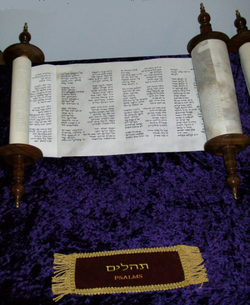Psalm 132
| Psalm 132 | |
|---|---|
 Scroll of the Psalms | |
| Book | Book of Psalms |
| Hebrew Bible part | Ketuvim |
| Order in the Hebrew part | 1 |
| Category | Sifrei Emet |
| Christian Bible part | Old Testament |
| Order in the Christian part | 19 |
Psalm 132 is the 132nd psalm of the biblical Book of Psalms. The Book of Psalms is part of the third section of the Hebrew Bible and a book of the Christian Old Testament. In the Greek Septuagint version of the bible, and in its Latin translation in the Vulgate, this psalm is Psalm 131 in a slightly different numbering system. It is the longest of 15 psalms which begin with the words "A song of ascents" (Shir Hama'alot).
Text[]
This psalm has 18 verses. The New Revised Standard Version associates it with "the Eternal Dwelling of God in Zion".[1] The Jerusalem Bible describes it as a "messianic hymn" and an "anniversary hymn" recalling the finding and translation of the Ark of the Covenant, which are recounted in 1 Samuel 6 and 2 Samuel 6 in the Hebrew Bible.[2] The words of verse 6, "we heard of it in Ephrathah", refer to the ark.
Uses[]
Judaism[]
- Recited following Mincha between Sukkot and Shabbat Hagadol.[3]
- Verses 8-10 are among those recited as the Torah scroll is placed in the ark.[4]
- Verse 13 is the fourteenth verse of Yehi Kivod on Pesukei Dezimra.[5]
New Testament[]
- Verse 5 is quoted in Acts 7:46[6]
- Verse 11 is quoted in Acts 2:30[6]
- Verse 17 is quoted in Luke 1:69[6]
Catholic Church[]
As St. Benedict of Nursia mostly attributed the last psalms to the vespers offices, this Psalm 132 was traditionally sung during the celebration of Vespers on Tuesday, according to the Rule of Saint Benedict, fixed at 530.[7][8]
In the current Liturgy of the Hours, Psalm 132 is recited at the Office of Readings on the Saturday of the first week,[9] and at Vespers on the Thursday of the third week. It is separated into two parts. In the liturgy of the Mass it is read for the feast of the Assumption.
Musical settings[]
- "Let David Be Remembered" - Thaxted, Martin E. Leckebusch, 2003[10]
- Marc-Antoine Charpentier set one "Memento domine" H.155, for soloists, chorus, 2 treble instruments and continuo (?c1670)
References[]
- ^ Psalms 132:1
- ^ Jerusalem Bible (1966), Psalm 132
- ^ The Complete Artscroll Siddur page 530
- ^ The Complete Artscroll Siddur page 148
- ^ The Complete Artscroll Siddur page 66
- ^ a b c Kirkpatrick, A. F. (1901). The Book of Psalms: with Introduction and Notes. The Cambridge Bible for Schools and Colleges. Vol. Book IV and V: Psalms XC-CL. Cambridge: At the University Press. p. 840. Retrieved February 28, 2019.
- ^ Règle de saint Benoît, traduction de Prosper Guéranger,(Abbaye Saint-Pierre de Solesmes)p.47.
- ^ Psautier latin-français du bréviaire monastique, p. 504, 1938/2003.
- ^ The main cycle of liturgical prayers takes place over four weeks.
- ^ "Let David Be Remembered (Psalm 132)". Hymnary.org.
External links[]
| Wikimedia Commons has media related to Psalm 132. |
- Psalms